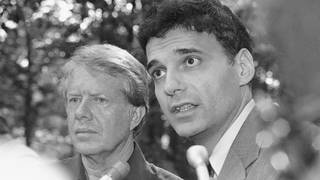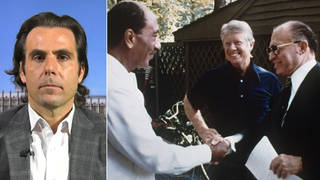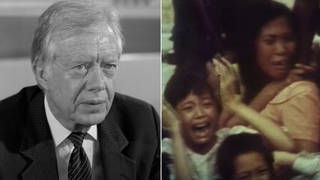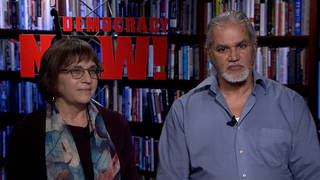
Related
We speak with the uncle of Jordan Neely after a New York jury on Monday acquitted veteran Daniel Penny in the death of the beloved New York street performer on a Manhattan subway train last year. Penny was found not guilty of criminally negligent homicide. The judge dismissed a more serious manslaughter charge. Penny will not face any prison time for the killing. Neely was in the midst of a mental health crisis on May 1, 2023, when Penny attacked and held him in a chokehold for several minutes, even after Neely stopped moving. “That trial just was ridiculous,” says Christopher Neely, who had tried to help his nephew and bring him home amid his mental health struggles. He says the family was already resigned to Penny not serving any prison time, but still wanted some measure of accountability at trial. “I was just hoping and praying that we would get some justice, but we didn’t get no justice.”
Transcript
AMY GOODMAN: This is Democracy Now!, democracynow.org, The War and Peace Report. I’m Amy Goodman.
We look now at the tragic deaths of two Black men who died while experiencing mental health crises. Both of these stories contain graphic descriptions of violence.
We begin here in New York, where protests are continuing after a jury Monday acquitted subway vigilante Daniel Penny in the chokehold death of the street performer Jordan Neely on a Manhattan subway train last May, finding Penny not guilty of criminally negligent homicide.
PROTESTERS: Justice for Jordan Neely! Justice for Jordan Neely! Whose streets? Our streets! Whose streets? Our streets!
AMY GOODMAN: Neely was just 30 years old and a beloved Michael Jackson impersonator. He was unhoused. He was hungry. He was crying out for help, when Penny, a white former U.S. marine, attacked him, pinned him down on a subway train by the neck for six minutes.
Neely’s family has separately filed a civil lawsuit against Penny. Neely’s father, Andre Zachery, was removed from the New York courtroom Monday after protesting the not-guilty verdict, along with others. Zachery spoke from outside the courthouse.
ANDRE ZACHERY: I miss my son. My son didn’t have to go through this. I didn’t have to go through this, either. It hurts, really, really hurts. What are we going to do, people? What’s going to happen to us now? I had enough of this. System is rigged. Come on, people. Let’s do something about this.
AMY GOODMAN: For more, we’re joined by Christopher Neely, uncle of Jordan Neely. He was in the courtroom during parts of the trial.
Thank you so much for being with us, Christopher. Our deepest condolences on the loss of your nephew.
CHRISTOPHER NEELY: Thank you.
AMY GOODMAN: And I’m so sorry that as you were in the courtroom, you had to see over and over again what happened to your nephew.
CHRISTOPHER NEELY: Yes.
AMY GOODMAN: Can you share your reaction to the verdict?
CHRISTOPHER NEELY: I was totally taken aback. I was — I was — it was very hurtful. It was so unexpected. Friday, before the judge sent the jury away for the weekend to tell them to have a good weekend and think on their verdict, we had people in the jury fighting for Jordan Neely. They were fighting for him. People believe that Jordan Neely should have been alive today. A lot of people did.
AMY GOODMAN: Tell us about who Jordan was. I know you brought something that is very precious to you, that —
CHRISTOPHER NEELY: Yes.
AMY GOODMAN: — was precious to Jordan.
CHRISTOPHER NEELY: Yes, yes, yes. Jordan, first of all, he was my sister’s son. He stayed with me and my sister. We grew up in the house together. He was just a wonderful kid. He loved sports. He loved art. He loved to dance. And he loved to play chess. Like, I’ve been a chess player for a long time. And on my free time, I would play with him. And he really enjoyed the game. He liked to dress up. He always liked to look in the mirror and dance with the microphone, get his colors, anything shiny. Anything shiny.
AMY GOODMAN: You brought a Michael Jackson jacket?
CHRISTOPHER NEELY: Yes, I —
AMY GOODMAN: Can you show us?
CHRISTOPHER NEELY: Yes, I did. This is a remake that I got Jordan —
AMY GOODMAN: Wow!
CHRISTOPHER NEELY: — when he was maybe 25, 24, 25. I think he wore it like two or three times maybe. My mother kept it in the house. This is off the — I got this made off the Michael Jackson soundtrack “Leave Me Alone.” At the end of the video, this is the jacket that he had on.
AMY GOODMAN: You can hold it up.
CHRISTOPHER NEELY: Sure.
AMY GOODMAN: Wow! So, for our radio listeners, Christopher is holding up this gold, red and black — what you definitely identify with Michael Jackson — jacket.
CHRISTOPHER NEELY: Yes, yes. These are the buttons. It took a while to get it done, but they did a great job, I think. This is the back of it. I loved it. It fit him perfectly. And my mother —
AMY GOODMAN: Many New Yorkers, when Jordan died, shared videos of Jordan performing as Michael Jackson.
CHRISTOPHER NEELY: Yes.
AMY GOODMAN: He was very well recognized. You, Christopher, as Jordan’s uncle, would go around the city looking for him sometimes. Is that right?
CHRISTOPHER NEELY: That’s correct.
AMY GOODMAN: Subway stops, bus stops?
CHRISTOPHER NEELY: That’s correct. Anywhere I can find him, the bus terminal, wherever I think he might be, like if it’s cold, where he might be at, or whatever the case might be, especially when I found out that he was smoking weed. That was the first thing I found out about him. He was smoking weed. So I wanted to get on him about that and stand strong and just, like, you know, coming home.
AMY GOODMAN: Can you talk about how the police dealt with what happened, how the police dealt with the man who killed your nephew, and what happened on that day, what you came to understand?
CHRISTOPHER NEELY: It was buddy-buddy. I mean, when you look at the interview, it seems like they were buddy-buddy. They were leading him into finding out what occurred, but after they found out what occurred and they knew that he was dead, they still treated him like buddy-buddy. You know, he was a marine. The guy was a — the officer was an ex-marine, ex-military. He treated him like he was his friend, his buddy, old pal. No handcuffs, no nothing. It’s just unheard of.
AMY GOODMAN: We’re talking about Daniel Penny —
CHRISTOPHER NEELY: Daniel Penny.
AMY GOODMAN: — the ex-marine.
CHRISTOPHER NEELY: The ex-marine.
AMY GOODMAN: Very different than what happened just in this last week as we witnessed this nationwide manhunt —
CHRISTOPHER NEELY: Yes.
AMY GOODMAN: — against the killer of Brian Thompson —
CHRISTOPHER NEELY: Yes.
AMY GOODMAN: — the CEO of UnitedHealthcare.
CHRISTOPHER NEELY: Oh, yeah, that didn’t happen in the Jordan Neely case at all. They actually let him go. They let him go.
AMY GOODMAN: They let Daniel Penny go.
CHRISTOPHER NEELY: Yeah, and we had to fight for justice.
AMY GOODMAN: He had put him in a chokehold, even when passengers — he said that he was defending the other passengers from your nephew.
CHRISTOPHER NEELY: Correct.
AMY GOODMAN: Many passengers were saying, “Let him go.”
CHRISTOPHER NEELY: Right. A lot of passengers — if you listened on the video, a lot of passengers are saying, “If you keep holding onto him, he will die.” You know, you had a guy that called his wife that was from the military, that was just giving him some advice on what to tell the guy that was holding his hand. And nobody listened. Nobody listened.
AMY GOODMAN: Has the mayor’s office, has Mayor Adams, who is a former police officer himself — has he reached out to you and to your family?
CHRISTOPHER NEELY: Not at all. Not — he didn’t come to the funeral, the wake. He didn’t — all he’s been saying is, you know, that justice was served for the city, especially after the verdict. I mean, everybody heard him. I’m not even giving too much attention to Eric Adams. He’s just, to me, just a straight creep.
AMY GOODMAN: So, right now there’s a lawsuit against Daniel Penny —
CHRISTOPHER NEELY: Correct.
AMY GOODMAN: — by his father, Andre Zachery?
CHRISTOPHER NEELY: Correct.
AMY GOODMAN: And how else are you moving forward?
CHRISTOPHER NEELY: Oh, any way possible. Like, the way it was done, like just the trial, I really appreciate the prosecutors. I really appreciate everybody that helped. But I want to move forward in a way to where, hopefully, I can get the federal government involved somehow, someway.
The trial just was ridiculous. I’ve never seen anything like that. You know, you got a top charge. They take the top charge off, without even letting anybody from the family know about that, and try to get him on criminal neglect homicide. And then that didn’t work.
And then, when you ask the district attorney about how much time he would get if he was to get convicted — from the beginning, when this first started, for me, I was involved deeply with the district attorney’s office in trying to find out what time is he going to get if he gets convicted — they told me 19 years for manslaughter in the second degree, which is the max, and criminal neglect homicide, the maximum is five years. I said, “Well, how much would he get on the top charge?” They told me, “I don’t think he — he might do a year or two, or he might get probation.” So, if that’s the case, how much is he going to get for criminal neglect homicide? “Oh, he’s not going to do no time.” So I already knew, from the beginning, that he was probably going to do no time. So, this here, I was just hoping and praying that we would get some justice, but we didn’t get no justice.
AMY GOODMAN: And this was Manhattan DA Alvin Bragg’s office.
CHRISTOPHER NEELY: Correct.
AMY GOODMAN: Well, we’re going to follow this case. Christopher Neely, uncle of Jordan Neely, thank you so much for joining us. Again, our condolences to your family.











Media Options